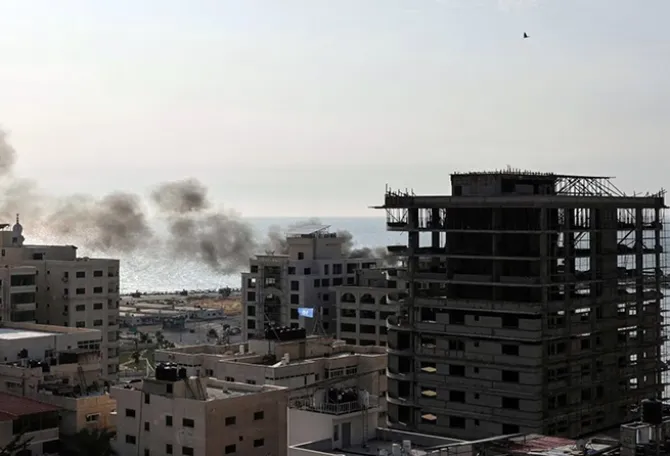-
CENTRES
Progammes & Centres
Location
The recent shift by the Middle East prioritising geoeconomics over the Palestinian issue could suffer a setback. The crisis ignited by Hamas highlights that the gap between top-heavy policy decisions and groundswell public opinions, movements, and crisis points need to be addressed by regional powers to ensure long-term sustainability of economic cooperation programmes

The horrific terror attack conducted by Hamas against Israel this past week was of mammoth scale. With over 900 dead in Israel and 500 in Gaza in retaliation strikes, the unfolding crisis has the potential of pulling a “new” Middle East (West Asia) back to its old fractures. While the Palestine issue has been the nucleus of regional geopolitics for decades, recent shifts in the region prioritising geoeconomics could suffer a setback going forward. The ideation of a “new” Middle East gained institutional traction in 2020, when the United Arab Emirates (UAE), Bahrain and Israel normalised relations and established official diplomatic contact as part of the “Abraham Accords”, brokered under the auspices of the US and then President Donald Trump.
This opened new possibilities of economic cooperation, and more importantly, brought Israel closer to the flourishing business environment in Arab centres such as Dubai. Israel’s famed tech sector saw Dubai as a springboard to access global economies, and trade between the two is expected to increase beyond an already impressive $2.5 billion on the back of a new free trade agreement signed between the two earlier this year. The fundamental shifts above, breaking decades of monopoly of regional tensions and distrust also gave birth to wider geoeconomics projects such as the setting up the India-Israel-UAE-US grouping, known as the I2U2 in 2022, to foster economic cooperation between the three regions.
Israel’s famed tech sector saw Dubai as a springboard to access global economies, and trade between the two is expected to increase beyond an already impressive $2.5 billion on the back of a new free trade agreement signed between the two earlier this year.
More recently, on sidelines of the G20 summit in New Delhi, another economic initiative, the India-Middle East- Europe Economic Corridor (IMEEC) was announced, bringing in even more stakeholders such as Saudi Arabia, UAE, Israel, Italy, Germany, the European Union and in its peripheries even the likes of Jordan. However, these are the “big ticket” projects. While the I2U2 has still managed to gain some steam behind it, IMEEC is still on paper, and is expected to be fleshed out over the next months. Connectivity projects are clunky, difficult, and can take decades to come to fruition (if at all), requiring both political patience and are massively capital-intensive. Under these big and marketable announcements, in the Middle East, a lot of regional corrections and dramatic economic shifts are also afoot. A prime example is Saudi Arabia’s moves to delink itself from the addiction of petro-dollars as the world moves towards green energy solutions. Riyadh recognises that while oil will prevail for some time to come, it will not remain the core fuel driving global economics in the future and this requires developing domestic industries, such as in services and manufacturing. This also puts the kingdom and its young new heir apparent, Crown Prince Mohammed bin Salman, in a vulnerable position.
Global oil prices flinched soon after the terror attack, potentially an unwanted challenge for net importers like India entering the critical phase of both state and general elections. Other geopolitical fault lines in the region, such as the war in Yemen, the Syrian crisis, instability in Iraq and so on, are also being looked into through mechanisms such as normalisation between Saudi and Iran brokered by China amongst other initiatives. All the above-mentioned strategic manoeuvres could be undone by the unfolding events in Israel and Gaza, with one of Hamas’s core intentions being to underscore that a “new” Middle East cannot be designed without a resolution of the Palestinian issue. In essence, dragging regional stakeholders back to the drawing boards, and reigniting the biggest fault line.
Global oil prices flinched soon after the terror attack, potentially an unwanted challenge for net importers like India entering the critical phase of both state and general elections.
Attempts to preserve the region’s new geoeconomics can already be seen in play. The UAE’s initial statement on the attack walked on glass as it avoided squarely placing the blame on Israeli political actions over the past months. The Saudis had to be more pragmatic, returning to a nomenclature of addressing Israel as an “occupying” force. An Israel-Saudi normalisation is widely believed to be off the table in the coming months, as regional monarchies and states look to pivot with public opinion from the Muslim world which, while may not side with Hamas, but does side with an overall Palestinian cause. Finally, it is in the interest of the global community to support the regional integration aims initiated by the Arab world, including with Israel. While many across the spectrum, including India, continue to call for a two-state solution to the crisis, the likeliness of that as a final result is minimal. Situation in the Middle East may get worse in the coming time before it becomes better. The current state of play perhaps highlights that the gap between top-heavy policy decisions and groundswell public opinions, movements, and crisis points need to be addressed by regional powers which will allow a semblance of long-term sustainability and future economic stability of the region. New systems such as the I2U2, IMEEC amongst others in the long term should and would be beneficial for all, including the Palestinians.
This commentary originally appeared in Money Control.
The views expressed above belong to the author(s). ORF research and analyses now available on Telegram! Click here to access our curated content — blogs, longforms and interviews.

Kabir Taneja is a Deputy Director and Fellow, Middle East, with the Strategic Studies programme. His research focuses on India’s relations with the Middle East ...
Read More +